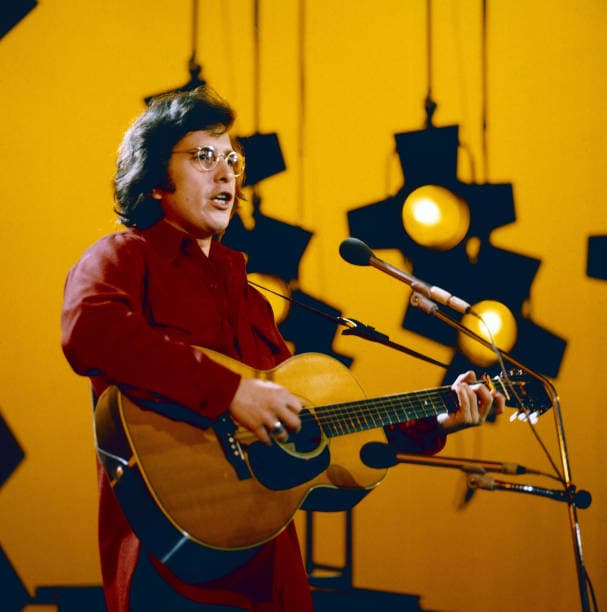
“Vincent (Starry Starry Night)” – Don McLean’s Poetic Homage to Van Gogh
Released in 1971 on Don McLean’s iconic album American Pie, “Vincent (Starry Starry Night)” stands as one of the most emotionally stirring and beautifully crafted ballads in modern music. The song, a tribute to the troubled yet brilliant artist Vincent van Gogh, is a work of art in its own right, blending introspective lyrics with delicate acoustic guitar melodies. While it didn’t achieve the same commercial heights as McLean’s American Pie, “Vincent” resonated deeply with listeners. The song peaked at No. 12 on the Billboard Hot 100 in the United States and reached No. 1 on the UK Singles Chart, solidifying its status as a beloved classic worldwide.
From the moment the song begins with the soft, finger-picked guitar and the opening lines—“Starry, starry night / Paint your palette blue and gray”—McLean sets a reflective and melancholic tone. The lyrics reference one of Van Gogh’s most famous paintings, “The Starry Night,” but they delve far deeper than just art appreciation. McLean uses the painting as a metaphor to explore Van Gogh’s troubled life, his battle with mental illness, and his inability to find acceptance or peace in the world. The song’s tone is both mournful and compassionate, portraying Van Gogh as a misunderstood genius who saw the beauty in the world but couldn’t escape his personal suffering.
One of the most poignant aspects of “Vincent” is how McLean weaves sympathy and sorrow into the lyrics. The lines “They would not listen, they did not know how” capture the sense of alienation Van Gogh felt throughout his life. McLean subtly suggests that the world was ill-equipped to understand the artist’s brilliance during his lifetime, leading to his tragic demise. The chorus echoes this lament, repeating the idea that those around Van Gogh failed to recognize his talent and soul:
“Now I understand what you tried to say to me / How you suffered for your sanity / How you tried to set them free.”
McLean’s soft, emotive delivery perfectly complements the song’s themes. His voice carries both gentleness and sadness, as though he is offering a personal eulogy to Van Gogh, long after the artist’s tragic death. The simplicity of the acoustic arrangement keeps the focus on the lyrics, allowing the story and sentiment to unfold naturally. The absence of elaborate instrumentation enhances the song’s intimate, almost confessional feel, as if McLean is sitting alone with his guitar, sharing his thoughts about Van Gogh’s life and struggles.
What makes “Vincent” particularly powerful is how it speaks not only to Van Gogh’s story but also to anyone who has ever felt misunderstood or isolated. It resonates with those who have struggled with mental health or felt alienated from society, making it a deeply personal and universal song at the same time. The line “This world was never meant for one as beautiful as you” has become one of the most quoted lyrics in music, encapsulating the bittersweet idea that some souls shine too brightly for the harsh realities of the world.
Despite its melancholy subject, “Vincent” is not a song of despair—it is a song of empathy and recognition. McLean offers a tribute to the artist not just by recounting his pain but by celebrating his art and his vision. In a way, the song gives Van Gogh the appreciation he never received during his lifetime, making it a posthumous gift from one artist to another.
Upon release, “Vincent” received critical acclaim for its lyrical depth and emotional impact. The song’s success on the charts, particularly in the UK, further cemented McLean’s reputation as a master songwriter capable of capturing complex emotions in simple, poetic language. Though “American Pie” remains his most famous song, “Vincent” has garnered a devoted following, with many considering it McLean’s finest work. Over the years, it has been covered by numerous artists and has become a staple in playlists celebrating introspective and folk music.
“Vincent” remains relevant to this day, resonating in a world that continues to grapple with mental health awareness. McLean’s gentle, poignant words encourage listeners to reflect on the ways society treats those who think and feel differently, offering a timeless reminder that beauty often comes with suffering. Van Gogh may have left the world too soon, but through Don McLean’s song, his life, struggles, and art live on in the hearts of listeners around the globe.
To this day, “Vincent” is more than just a song—it is a meditation on art, mental health, and empathy, a reminder that sometimes the most brilliant souls burn out too soon, leaving behind only their art as proof they were ever here at all.